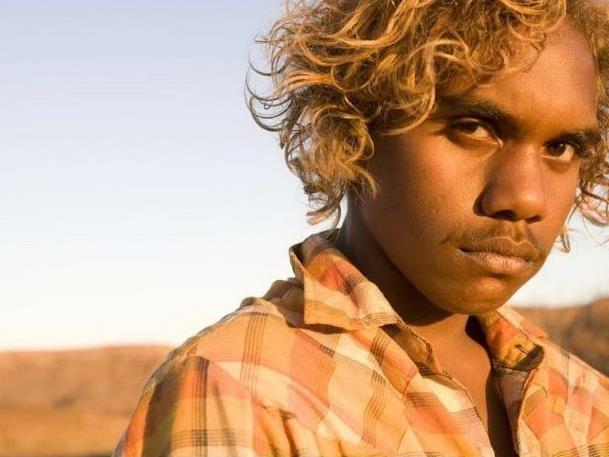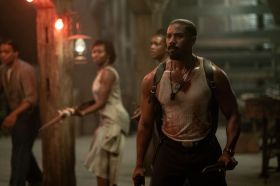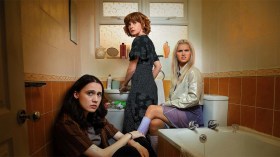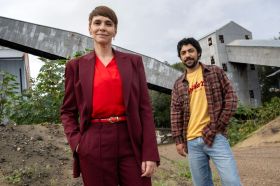Image: Warwick Thornton’s Samson & Delilah (2009) came in at number 3 on a poll that also included Thornton’s more recent Sweet Country in the Top Ten.
It’s a time-old tactic for generating publicity. Conduct a poll, publish the results and let the debate begin, especially when it’s a topic as subjective as the Greatest or Best Films of all time. But what do you do when that’s been done a million times and everybody’s sick of hearing about Citizen Kane or, in Australia, Wake in Fright or Mad Max? Simply limit the time period to the most recent century or decade, and suddenly there’s a whole fresh list to contemplate, thus bypassing the usual favourites and making for tasty clickbait. (There’s no guarantee you’ll escape the ghost of Mad Max however!)
This cunning plan is exactly what newish online film portal Flicks.com.au has executed with its survey of 51 Australian film critics (26 men and 25 women drawn from major news outlets, radio, podcasts and TV), who voted for their top ten Australian feature films from the year 2000 onwards, thus creating a new list to ponder and argue about: The 25 Greatest Australian Films of the 21st Century.
It’s a clever strategy on a number of levels, including the fact that 51 Australian film critics (myself included) are now aware that Flicks exists. Because we participated, we have some kind of investment in the list, and are more likely to give it some attention (for example, this article).
But all cynicism aside, you can’t begrudge a publication giving Australian films more publicity, and every time a list like this is made, it helps to establish a canon of must-see films, while also highlighting a few under-recognised gems. This particular poll is also valuable because it publishes the complete record of how every critic voted, from David Stratton and Margaret Pomeranz, to Fairfax’s Jake Wilson, News Corp’s Vicky Roach and Leigh Paatsch, ABC Radio’s Jason Di Rosso, The Lifted Brow’s Rebecca Harkins-Cross and Adolfo Aranjuez from Metro magazine.
So how did they (we) vote? Here’s the list:
The 25 greatest Australian films of the 21st century, as voted by 51 Australian Film Critics:
25. Predestination (2014)
24. Wolf Creek (2005)
23. Hacksaw Ridge (2016)
22. Mary and Max (2009)
21. Sherpa (2015)
20. Kenny (2006)
19. Noise (2007)
18. The Tracker (2002)
17. Lion (2016)
16. The Dish (2000)
15. The Dressmaker (2015)
14. Hail (2011)
13. Look Both Ways (2005)
12. Ten Canoes (2006)
11. Moulin Rouge! (2001)
10. Mystery Road (2011)
9. Snowtown (2011)
8. Sweet Country (2017)
7. The Proposition (2005)
6. The Babadook (2014)
5. Lantana (2001)
4. Chopper (2000)
3. Samson & Delilah (2009)
2. Animal Kingdom (2010)
1. Mad Max: Fury Road (2015)
It’s an interesting and eclectic collection. Note the inclusion of Jen Peedom’s 2015 documentary Sherpa – highlighting the fact that feature-length docos were also eligible. The enduring popularity Ray Lawrence’s 2001 classic Lantana at number 5 is also notable. (I confess, it’s my favourite.) Only one of the Top Ten was directed by a woman (The Babadook’s Jennifer Kent). Four women appear in the total 25 which is not bad given how few women actually get to direct features in this country. Alongside Peedom and Kent, the list also celebrates Jocelyn Moorhouse with The Dressmaker and Sarah Watt with Look Both Ways.
There are some other interesting takeaways from the poll. As Flicks.com.au’s New Zealand-based publisher, Paul Scantlebury, noted in the press release sent out last week, ‘half of the ten highest rated films were directed by first-time filmmakers. And two filmmakers had more than one film in the top 25. They were Warwick Thornton with Samson & Delilah and Sweet Country, and Rolf de Heer with Ten Canoes and The Tracker.’
The man who actually pulled the poll together is Luke Buckmaster, chief critic for Flicks.com.au and the Guardian Australia’s film critic. As the author of a biography of the filmmaker George Miller, titled Miller and Max: George Miller and the Making of a Film Legend (published by Hardie Grant), he must be mighty chuffed and not very surprised to see Mad Max: Fury Road in the number one position.
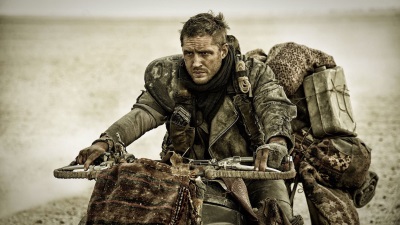
Image: The spectre of Max cannot be escaped in Australian Best Film polls. Mad Max Fury Road came in at number 1. Source – Flicks.com.au.
Curiosity piqued, we sent through a few questions by email to Luke Buckmaster:
Q: First of all, what is Flicks.com.au – who’s behind it, how’s it funded, how long’s it been going? And what is your role there?
Flicks was founded by a rambunctious New Zealand film lover, the publisher Paul Scantlebury, and his brother in 2005. It was essentially a movie session times website for New Zealanders. In 2014, Paul looked at a world map and noticed there was a much bigger country to the right called Australia. Flicks was launched here then. At least that is my understanding of the company’s history. Paul and his brother sold Flicks to a corporation called Vista Group International in 2016, with Paul remaining in the hot seat. Although it launched here a handful of years ago, it is only in the last 12 months that Flicks Australia has expanded to have a really strong editorial focus.
Paul was passionate that, in order to have a strong presence in Australia, the website would need a team of local critics and writers. That is where I come into it. I have been contributing to Flicks for around a year. Initially that involved writing two or so pieces a week. In the last couple of months that has expanded into other editorial duties, such as recruiting other writers to produce content including features and film reviews. The site has grown steadily over the past few years, and boomed in the last few months. This month the site has received over 600,000 unique visitors. The Flicks business model is advertiser funded. There are two main functions of the site. One: it’s a nationwide cinema guide listing every cinema, every movie playing in cinemas, and every showtime in Australia. Two: it provides an independent editorial component, featuring passionate and fearless commentary from professional writers and local cinephiles. Our entire user base are movie goers or movie lovers.
Q: What was the impulse behind this particular poll?
The poll was inspired by a similar online initiative conducted by the BBC in 2016, [21st Century’s 100 Greatest Films] to which I contributed. The BBC’s poll sampled a larger body of film critics than we did – 177 – though that is to be expected given they incorporated critics from all around the world. Late last year, in December I think, Paul asked me whether I was aware of a similar initiative existing in Australia. I told him I couldn’t even think of a poll of Australian film critics full stop, let alone one of this scale. He was convinced it was a good idea. I was convinced it would be an awful lot of work. It turned out we were both right.
In the coming months I managed to distract Paul by proposing a series of much smaller ideas. Also by regaling him with stories of strange and interesting things I had watched – such as a Nicolas Cage feature film in virtual reality, and a version of The Jungle Book with all the animals edited out of it. But none of these distractions worked. He never forgot about the poll and kept bringing it up. Feeling I had exhausted all options with which to divert his attention, I agreed and started working on it.
Q: How easy or difficult was it to get people to participate in the poll?
Everybody was different. The first two people I contacted, David Stratton and Margaret Pomeranz, I emailed late at night and they responded with their votes the very next morning. Other people took a couple of days to respond, or a couple of weeks. Some people needed to be badgered and some people never responded at all. A couple of well-known and well-respected critics politely declined to participate, on the grounds that they felt they had substantial gaps in their knowledge and wanted to treat the poll seriously. I respect that.
The vast majority of people, who were contacted by myself and the team at Flicks, were very happy to participate. Many grumbled about how difficult it was to choose only ten, let alone rank them. I feel their pain. I also feel guilty that some films I love didn’t make my own top ten, such as The Square, The Infinite Man, Animal Kingdom and Snowtown. I feel worse about those first two – The Square and The Infinite Man – because they are terrific films that haven’t received the recognition they deserve. That gives me an idea for a second poll: ‘Most under-recognised Australian films.’ Don’t tell Paul or I’ll never hear the end of it.
Q: What were the most interesting or surprising things to come out of the poll for you personally?
I was pleasantly surprised that Amiel Courtin-Wilson’s crime drama Hail performed as well as it did, landing at number 14. I had it in my head that this film was criminally under-recognised. Turns out I was wrong, at least when it comes to critical opinion. Few films can truly, truthfully claim to be unique and extraordinary but this is one of them. Courtin-Wilson is one of the most interesting Australian filmmakers working today. I was also surprised that The Dish ranked as highly as it did, placing sixteenth. Generally speaking Australians are not terribly patriotic people, and this is a patriotic movie. Then again a cynic – not that I am one, of course, perish the thought! – could argue the entire film is pegged to an American achievement.
Q: What do you think are the biggest misconceptions about Australian cinema?
I believe people often associate Australian cinema with narratives or broad assumptions that have little value, and are often demonstrably untrue. For example many people have said that Australia doesn’t make enough genre films. But if you look at the films in our poll, the majority of films are genre films. Other people say Australia doesn’t make comedies. That is also not true. I saw a good one just last week: The Merger. I saw an excellent one in January: Swinging Safari. I saw a terrible one in February: The BBQ. And another terrible one in March: That’s Not My Dog.
Australian cinema is, in terms of genres and filmmaking styles, hugely diverse. Often these kinds of misconceptions are tied to the success (or lack of) that these films have at the box office. This is not a question of output but of reception, and everything that comes with that – including the distribution system, which is largely locked up by foreign i.e. American content. I believe it’s better to focus on issues that are real and pressing. For example the gender disparity in our film industry. My colleague Sarah Ward recently pointed out, in an article for Flicks, that so far this year more Australian cinema releases have featured Shane Jacobson as the lead character than a female protagonist. That is outrageous, as I think everybody would agree.
We leave Luke Buckmaster on that controversial note.
In the meantime, we await the next poll of under-recognised films, and also notice in passing that Flicks happens to be one of the few new film reviewing outlets that actually offer paid work to critics, and that’s something to applaud. And lest you think such lists are to be taken too seriously, let me add that looking at my own contribution now a few weeks later, I’d probably have a different Top Ten or a juggled order. These polls are to be taken with a huge grain of salt, but they’re no less tasty for that fact.
